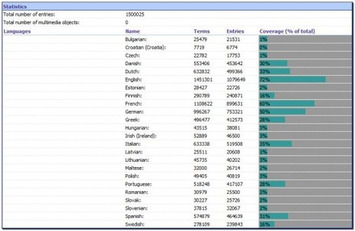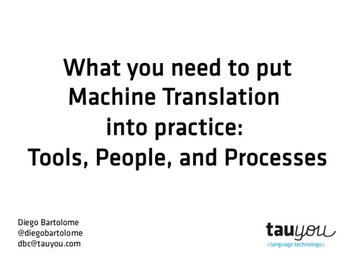Skype Translate demo showed real-time voice-to-voice translation between English and German. By Samuel Gibbs
Get Started for FREE
Sign up with Facebook Sign up with X
I don't have a Facebook or a X account
 Your new post is loading... Your new post is loading...

Charles Tiayon's curator insight,
October 5, 2014 9:27 PM
“All schools should be provided with human resources with regards to teaching in that language,” the union said in a statement. The congress also called for teacher training colleges to prioritise training teachers of indigenous languages. The theme of the congress was “Restore the character of Sadtu as a union of revolutionary professionals, agents of change and champions of people’s education for people’s power in pursuit of socialism”. “We declare that socialism is the future as it guarantees sustainable development and deconstruct[s] the exploitation of one man by another and will end poverty and misery in the world.” The congress resolved that in the determination of teaching posts, the degree of complexity of curricula taught in different schools should be considered. Delegates also agreed that teachers in the early childhood development sector should be highly qualified, with relevant competencies in health, social, psychological and educational issues. “A standardised qualification must be agreed upon in order to establish uniform standards.” All schools should have support staff, such as therapists and psychologists, to help teachers deal with pupils who had difficulties with mainstream learning. The congress called for the Annual National Assessment (ANA) not to be “abused to label teachers and schools, thereby demoralising and de-professionalising them”. ANAs are tests to determine pupils’ levels of competency in literacy and numeracy. Feedback from the ANAs should be given to schools promptly, before the results were publicised, and should be followed up with meaningful intervention programmes. “At a broader level, delegates note the recent attacks on Chapter 9 institutions of democracy from those meant to lead them. “We are an organisation that fought many other injustices in our past and including the present and we have a moral obligation to protect these institutions even if it is against those that lead them,” Sadtu said. Last month the union called on Public Protector Thuli Madonsela to stop using her office to “attack the ANC”. This was after a letter Madonsela reportedly wrote to Zuma, about the R246 million spent on upgrades at his private Nkandla homestead in KwaZulu-Natal, was leaked to the media. ANC secretary general Gwede Mantashe has publicly criticised Madonsela and said she was on a crusade to discredit the party. At the time Sadtu’s national executive said in a statement: “The actions of advocate Thuli Madonsela are clear systematic signs planned to create anarchy and divisions within our society and the ANC in particular”.

Stanislav Okhvat's curator insight,
October 1, 2014 12:59 AM
Paul Filkin provides another useful article on importing IATE terminology database into various CAT tools. Since IATE published the entire EU terminology database in TBX format, there have been a number of articles on how to import this huge database into CAT tools. This article summarizes the latest developments in specialized tools for glossary import (Glossary Converter for SDL Trados Studio) and individual efforts to make this database more "digestible".

Charles Tiayon's curator insight,
September 16, 2014 6:42 PM
South Africans can now access health information about deadly disease, Ebola, in their preferred language on free online encyclopedia Wikipedia. Global language service provider, Rubric, has donated its translation services to Wikimedia ZA to provide South African citizens with essential health information on the disease. Rubric teamed up with Wiki Project Medicine and WikiAfrica to translate Ebola information in the full range of South African languages. The South African languages that the health information has been translated to include Xhosa, Zulu, Setswana, Sesotho, Siswati, Ndebele, Xitsonga, Tshivenda and Sepedi. READ MORENigerian Ebola education website traffic ‘soars’ Ebola outbreak: how prepared is your company for a pandemic? Ebola Wikipedia Ebola is a severe, often fatal illness in humans. Ebola outbreaks have a case fatality rate of up to 90%, according to the World Health Organisation (WHO). And since March this year, the Ebola outbreak has swept across West African countries Liberia, Sierra Leone and Guinea resulting in a death toll of more than 1,550 people so far. Although there haven't been any reported cases of Ebola in South Africa there are fears that the disease may find its way from West Africa. The Rubric partnership then aims to allow South Africans to get advice on how to prevent and recognise the symptoms of infection on Wikipedia.org in their home language. Françoise Henderson, chief executive officer at Rubric says in other instances UNICEF’s efforts to promote health messages in English and French is complicated by the majority of the population, especially in rural areas, not speaking colonial languages. “People need to have information in their own language to improve understanding of the measures that can reduce their risk of infection,” said Henderson. - See more at: http://www.itwebafrica.com/cloud/517-south-africa/233507-wikipedias-ebola-information-translated-into-sa-languages#sthash.wN4GJ06P.dpuf

Charles Tiayon's curator insight,
September 16, 2014 6:44 PM
Key translation memory application vendors have integrated Microsoft Translator into their products. Language Solution Providers (LSP) and businesses can leverage this integration to use automatic translation for a first pass when using human translators. Using automatic translation first can improve translator productivity by up to 30%. It also allows LSPs to offer tiered solutions to their internal and external customers by offering a range of service levels based on content type, language, and quality requirements. For more on translation memory applications vendors supporting Microsoft Translator, click here.

Charles Tiayon's curator insight,
September 16, 2014 8:21 PM
Automatic translation systems, also known as machine translation systems, are applications or online services that use machine-learning technologies to translate large amounts of text from and to any of their supported languages. Although the concept and interfaces to use these systems are relatively simple, the science and technologies behind them are extremely complex and bring together several leading-edge technologies such as machine learning, big data, linguistics, cloud computing, and web APIs. What is Microsoft Translator? Used internally for Microsoft groups since 2006 and available as a SAAS web API for customers since 2011, Translator is the Microsoft automatic-translation solution. It is more specifically a linguistically informed statistical machine translation service. The service translates a “source” text from one language to a different “target” language. Used extensively within Microsoft, the Microsoft Translator API is incorporated across product localization teams, support teams, and online communication teams (e.g., Windows blog). This same service is also accessible, at no additional cost, from within familiar Microsoft products such as Office, SharePoint, Yammer, Lync, Internet Explorer, Bing, and Skype. How does it work?
Microsoft Translator is built on more than a decade of natural-language research at Microsoft. Rather than writing hand-crafted rules to translate between languages, modern translation systems approach translation as a problem of learning the transformation of text between languages from existing human translations and leveraging recent advances in applied statistics and machine learning. So-called "parallel corpora" act as a modern Rosetta Stone in massive proportions, providing word, phrase, and idiomatic translations in context for many language pairs and domains. Statistical modeling techniques and efficient algorithms help the computer attack the problem of decipherment (detecting the correspondences between source and target language in the training data) and decoding (finding the best translation of a new input sentence). Microsoft Translator unites the power of statistical methods with linguistic information to produce models that generalize better and lead to more comprehensible translations. The Microsoft Translator web service can be used in web or client applications on any hardware platform and with any operating system to perform language translation and other language-related operations such as language detection, text to speech, or dictionary. Leveraging industry-standard protocols (SOAP, HTTP, REST, and AJAX), the developer sends source text to the service with a parameter indicating the target language, and the service sends back the translated text for the client or web app to use. The Microsoft Translator service is hosted in Microsoft data centers and benefits from the security, scalability, reliability, and nonstop availability that other Microsoft cloud services—Office 365, Bing, Azure—benefit from. To see how Microsoft Translator can be integrated, use the “Translate this page” menu at the top right of this page to access the free Translator Web Widget and translate this page into any of the supported languages.

Charles Tiayon's curator insight,
September 14, 2014 5:26 AM
Maybe we’re only imagining it, but it seems like our language is changing faster today than ever before. With the language used for texting, our young generation has invented an English shorthand that at first was only understood by them, but now seems to have become accepted – or at least understood – by everyone. Many folks know the meaning of LOL and BTW now and accept such terms and, by the way, they are not just phrases we laugh out loud about anymore. We would be willing to bet that today’s teachers and parents struggle to remind young people that this type of communication is acceptable for texting but are not standard forms of English that can be used for everything. The words “you” and “are” still have to be spelled out sometimes. Many of us “older” folks are often appalled by the poor grammar that has seemingly become acceptable and is often used by television celebrities, movie stars and even politicians. We can’t count the number of times that a “g” is dropped at the end of a word, the subjects and verbs don’t agree, or the wrong words are used. However, it’s also fun to watch the changes in language. For example, we wonder when Google quit being just the name of a company and became a verb meaning to search for information – “I will google the team’s record.” We don’t know when this change occurred, but we do know it was long after Xerox became more than the name of a company and became a verb meaning to make copies – “I will Xerox those letters.” So, it’s obviously not something new. We recently learned there is even a name for changing nouns and occasionally other parts of speech into verbs. It’s called verbing. There are a bunch of new verbs that are used today that still sound awkward to us such as calendar and task. Our understanding stumbles a little when someone tells us, “I have been tasked with this project,” or we hear, “I will calendar that meeting.” Upon investigation, however, we discovered this is nothing new at all. Evidently Benjamin Franklin griped about the whole business of verbing in 1789 calling it “awkward and abominable.” We found examples of it from William Shakespeare and the 1552 Book of Common Prayer. Oops. This has gone on longer than we thought. We may have stumbled over these words that have recently been verbed, but we hadn’t looked at other words that were verbed so long ago they are commonplace today. Here are some examples: medal, rain, bottle, audition, diagnose, email, referee. Remember, we now guilt people into doing something, and we friend people on Facebook. So, now we know, verbing isn’t anything new, but Benjamin Franklin was right. The new words do seem awkward until they become integrated into the language. Let’s look at the word “tailgate.” Once upon a time it was the back of a pickup truck. Then it became a verb meaning someone is following a vehicle too closely. Then it became an adjective as in a tailgate party meaning a party out of the back of a vehicle, and now it’s a verb again: “Let’s tailgate before the Lobos game.” So verbing isn’t new. Let’s keep the tradition going – did you lottery this week? Contact the Ryans at ryan@abqjournal.com.

Charles Tiayon's curator insight,
September 13, 2014 11:53 PM
Aside from sneakily listening in on good-looking tourists' conversations on the subway, the joy of learning another language comes with a whole new perspective on expression and articulation. The more dialects you explore, the more you come to realize that there are certain emotions and phenomena that — while common feelings amongst all humans — manifest themselves particularly well in a certain language. |

Curated by Quezil Language Services
Agence de traduction basée au Cameroun I Cameroon-based translation agency - Contact: (+237) 243 298 177 - Website: www.quezil.com - E-mail: contact@quezil.com - WhatsApp: https://wa.me/message/BN5XLM5GWNPWL1
|





























